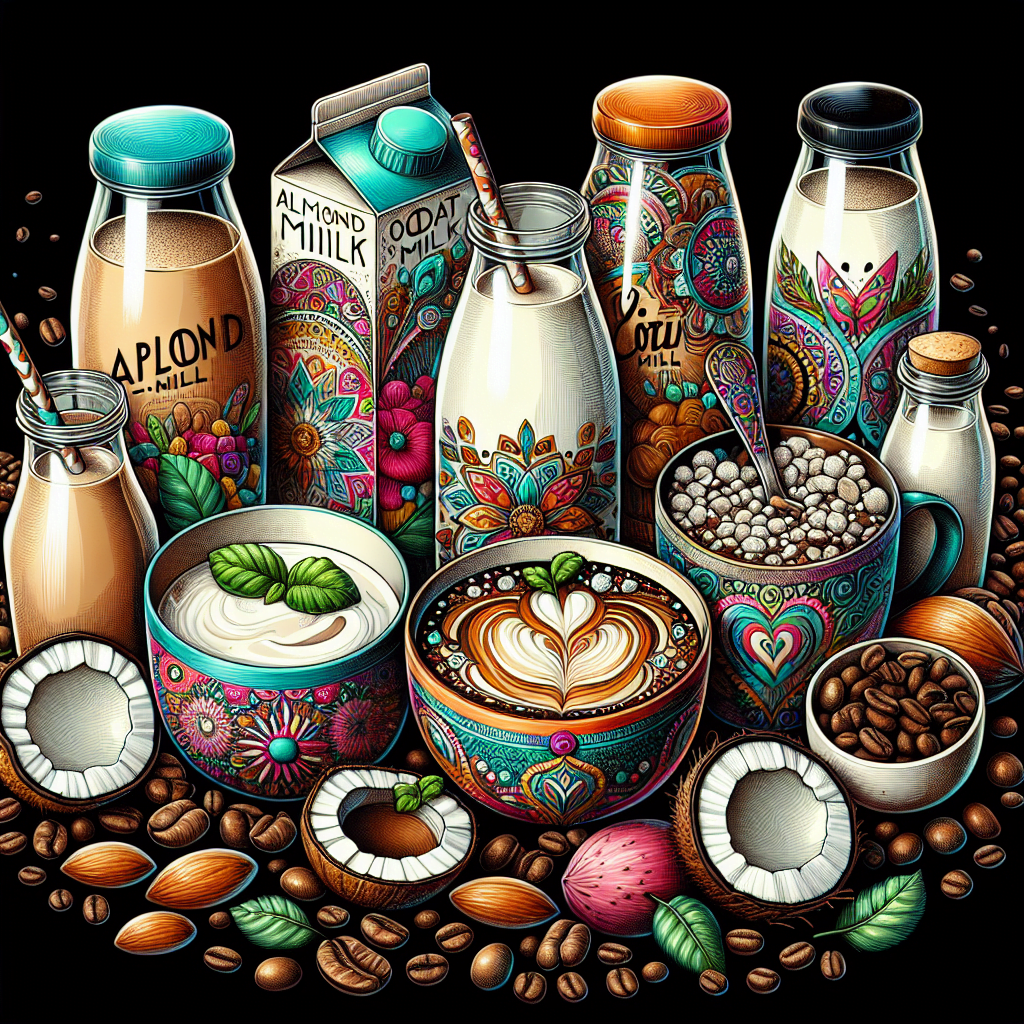If you’re a coffee lover who also follows a vegan lifestyle, you’re in for a treat. Our latest article on Caffeinated Blogging explores the world of vegan coffee options, specifically focusing on dairy-free milks and additives. Whether you’re looking to cut out dairy for health reasons or ethical considerations, we’ve got you covered. From almond milk to oat milk, we’ll guide you through the different milk alternatives and help you find the perfect one to complement your coffee. And if you’re feeling adventurous, we’ll also introduce you to some exciting additives that can take your coffee experience to the next level. So grab a cup of joe and join us on this tasty journey through the vegan coffee world!
Vegan Coffee Options: Dairy-Free Milks and Additives
Introduction to vegan coffee options
Welcome to Caffeinated Blogging, where we explore all things coffee-related. In this article, we will be discussing vegan coffee options, specifically dairy-free milks and additives. Whether you are a vegan or simply looking to reduce your dairy intake, there are plenty of delicious and nutritious alternatives to dairy milk that can enhance your coffee experience.
Types of dairy-free milks
-
Soy milk: Soy milk is a popular choice among vegans and those with dietary restrictions. It has a mild flavor that pairs well with coffee and provides a creamy texture.
-
Almond milk: Made from ground almonds and water, almond milk is another popular choice for vegan coffee drinkers. It has a subtle nutty flavor and a slightly thinner consistency compared to dairy milk.
-
Oat milk: Oat milk is made by soaking and blending oats with water. It has a creamy texture and a slightly sweet, oaty flavor that can complement the taste of your coffee.
-
Coconut milk: Coconut milk is rich and creamy, adding a tropical twist to your coffee. It has a mild coconut flavor that pairs well with both hot and iced coffee.
-
Rice milk: Rice milk is made by blending cooked rice with water. It has a naturally sweet flavor and a thin consistency, making it a lighter option for coffee.
-
Cashew milk: Cashew milk has a rich, creamy texture and a slightly sweet, buttery flavor. It can add depth and richness to your coffee without overpowering its taste.
-
Hemp milk: Hemp milk is made from hemp seeds and water. It has a mild, nutty flavor and a creamy consistency that can enhance the taste of your coffee.
-
Pea milk: Pea milk is made from yellow peas and has a creamy texture and neutral flavor. It is a good source of protein and can be a nutritious addition to your coffee.
Alternatives to dairy milk additives
If you prefer to add a creamer or milk alternative to your coffee, but don’t want to use dairy milk, there are several options available to you.
-
Nut-based creamers: Nut-based creamers, such as almond or cashew creamers, can add a rich and creamy texture to your coffee. They often come in a variety of flavors to suit your preferences.
-
Coconut creamers: Coconut creamers are made from coconut milk and often have a rich and decadent flavor. They can provide a creamy texture without the use of dairy.
-
Oat-based creamers: Oat-based creamers are made from oats and can add a creamy and slightly sweet flavor to your coffee. They are often a popular choice among those with nut allergies.
-
Soy-based creamers: Soy-based creamers are made from soy milk and can provide a creamy texture and a mild, nutty flavor to your coffee.
-
Seed-based creamers: Seed-based creamers, such as hemp or flaxseed creamers, are made from ground seeds and can add a creamy texture and nutty flavor to your coffee.
Choosing the best vegan milk for your coffee
When selecting dairy-free milk for your coffee, there are several factors to consider:
-
Flavor profile: Consider the taste of the milk alternative and how it will complement the flavor of your coffee.
-
Consistency: Think about the texture and thickness of the milk alternative and how it will affect the overall mouthfeel of your coffee.
-
Nutritional content: Look at the nutritional content of the milk alternative, such as its protein, fat, and sugar content, to ensure it aligns with your dietary needs.
-
Sustainability: Consider the environmental impact of the milk alternative, including its production methods and packaging.
-
Price: Compare the cost of different milk alternatives and choose one that fits within your budget.
-
Availability: Take into account the availability of the milk alternative in your area and choose one that is easily accessible to you.
Making your own dairy-free milk
If you prefer a more homemade approach, you can easily make your own dairy-free milk at home. Here are a few recipes to get you started:
-
Homemade almond milk: Soak almonds overnight, blend with water, and strain to remove the pulp. This homemade almond milk is fresh and creamy, perfect for adding to your coffee.
-
Homemade oat milk: Blend oats with water and strain to remove any remaining solids. This simple recipe creates a creamy and slightly sweet oat milk that pairs well with coffee.
-
Homemade coconut milk: Blend shredded coconut with water and strain to create homemade coconut milk. This rich and creamy milk alternative adds a tropical twist to your coffee.
-
Homemade cashew milk: Soak cashews, blend with water, and strain to create a smooth and creamy cashew milk. This homemade milk adds a rich and luxurious texture to your coffee.
Tips for using vegan milk in coffee
To get the most out of your vegan milk in coffee, here are a few tips:
-
Frothing techniques: Experiment with different frothing techniques to create a velvety texture in your coffee. Some milk alternatives, such as soy or oat milk, froth better than others.
-
Heat tolerance: Be mindful of the heat tolerance of your chosen milk alternative. Some may curdle or separate when exposed to high temperatures, so adjust your brewing methods accordingly.
-
Latte art: If you enjoy creating latte art, some milk alternatives may be better suited for this purpose due to their ability to hold shape and create intricate designs.
Conclusion
With the wide array of dairy-free milk options available today, vegan coffee drinkers can enjoy their favorite cup of joe without compromising on taste or ethics. Whether you prefer soy milk, almond milk, or any other alternative, there is a milk alternative out there to suit your preferences. So go ahead and explore the world of vegan coffee options and elevate your coffee experience to new heights. Cheers to a dairy-free and delicious cup of java!

